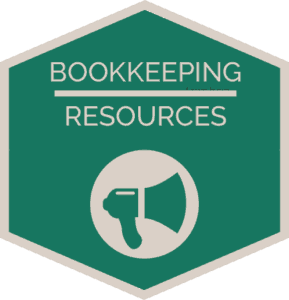
Accountants and bookkeepers are not the same thing! Read below.
It’s very common for new business owners to confuse the difference between an accountant and a bookkeeper. In fact, many people use “accountant” and “bookkeeper” interchangeably, even though they actually have separate functions. (Fun fact: Many bookkeepers don’t do taxes and many accountants don’t do bookkeeping!)
When you start a business or begin freelancing, one of the first professionals you’ll probably hire is an accountant, a bookkeeper, or both.
Your local CPA or tax preparer can help you stay on top of your tax obligations (TAXES — wildly important to stay on top of when you begin a freelancing career or start on the path of entrepreneurship).
Ideally, you’ll have both a tax preparer and a bookkeeper – a great financial team is invaluable when it comes to helping with personal and business finances.
What Does a Bookkeeper Do?
Bookkeepers keep tabs on an organization’s financial transactions. It’s a largely administrative task that requires great attention to detail in addition to proficiency with the appropriate tools, software (like QuickBooks Online), and systems.
Responsibilities can range from keeping track of company credit cards and daily sales receipts for a store or restaurant, to the tracking of income and expenses for consultants or artists.
For influencers, online marketers, and course creators, bookkeeping means keeping track of the various revenue streams and all company expenses. This information helps you make more informed business decisions, such as seeing whether YouTube ads or Instagram sponsorships are bringing in the most money and which expenses can be cut.
In essence, bookkeepers are in charge of finding and assembling the primary financial data used to compile financial statements, like receipts, invoices, and cash drawer reports. This primary financial data is also sometimes referred to as the “source documents” or the “source data”.
The accountant’s job is to compile, prepare, and review financial statements designated for external users by using this financial data– most often to prepare the business tax return.
Modern technology has revolutionized several accounting and bookkeeping processes and has transformed the way that business owners and managers oversee their finances. Many of these processes are easier than ever to manage, but still require a human touch and strict adherence to bookkeeping principles.
Bookkeepers verify that transactions have been entered into QuickBooks Online (or other systems) correctly so that the accountant can properly do their job. They manage your company’s transaction load and in some cases, lay the foundation for your recordkeeping system.
QuickBooks users, in particular, will want to work with a bookkeeper who’s a QuickBooks ProAdvisor, which is a certification given to financial professionals who are extremely knowledgeable with the QuickBooks Online ecosystem (everyone on the Good Cents team is a Quickbooks ProAdvisor!).
What Does an Accountant Do?
Accountants work with the summary of the documents that the bookkeeper prepares on an ongoing basis, and uses it to prepare financial statements.
Four financial statements must be made available to the general public under federal law through reports filed with the Securities and Exchange Commission for any publicly-traded company. These statements are:
- Income statement (also called “Profit and Loss statement”)
- Balance Sheet
- Statement of Cash Flows
- Owners’ Equity Statement
While most small businesses aren’t legally required to make their financial statements public, these statements are still required when seeking capital from investors or via bank loans.
These financial statements are prepared in accordance with accounting principles, namely GAAP (generally accepted accounting principles) or IFRS (international financial reporting standards). They’re given to users like banks, investment firms, and business services to apply for loans, find angel investors, or services required to get Apple developer accounts and similar processes.
For publicly-traded companies, bookkeepers maintain and verify the financial records, accountants ensure that the financial data is presented according to compliance with these standards.
For small business owners, the bookkeepers compile the data, and then the accountants use the data to prepare tax returns and engage in tax planning.
Bookkeeping vs. Accounting
Both accountants and bookkeepers can provide small business owners with advisory services such as when to reinvest funds in the company, how to control expenses, and how to set up systems to detect fraud. Having both make for a solid financial team.
Looking to complete your financial dream team? Book a free consultation with us to get started.

